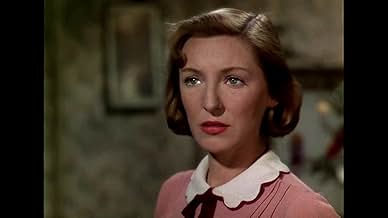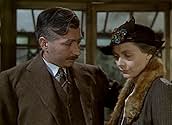VALUTAZIONE IMDb
7,3/10
4368
LA TUA VALUTAZIONE
Aggiungi una trama nella tua linguaJust after World War I, the Gibbons family moves to a nice house in the suburbs. They live an ordinary life throughout the years, but everything changes when World War II breaks out.Just after World War I, the Gibbons family moves to a nice house in the suburbs. They live an ordinary life throughout the years, but everything changes when World War II breaks out.Just after World War I, the Gibbons family moves to a nice house in the suburbs. They live an ordinary life throughout the years, but everything changes when World War II breaks out.
- Regia
- Sceneggiatura
- Star
- Premi
- 1 vittoria in totale
Robin Burns
- Man in Crowd
- (non citato nei titoli originali)
Mabel Etherington
- Lady in Crowd
- (non citato nei titoli originali)
Dan Lester
- Man in Crowd
- (non citato nei titoli originali)
Jim Morris
- Man Operating Small Boats at Fairground
- (non citato nei titoli originali)
Recensioni in evidenza
I throughly enjoyed this little gem of a film. It is very well acted and it was nice to see a smart well groomed Robert Newton being a million miles away from Long John Silver. It had some laughs,some drama and quite a bit of sadness and as you get to know the different characters you feel a genuine fondness for them. I was brought up in the 1950's and recall visiting relatives who had grandmas and spinster aunts living with them, just like in this film. Though there is bickering and some harsh words used by the family, it does represent a time when families stuck together and deep down loved and respected one another. If you get the chance to see this movie, then I am sure that you will enjoy it.
This film caught me completely unawares. I had never heard of it until it presented itself on daytime television one afternoon. I really dislike this type of film, as I find most of the time is spent on mediocre happenings in predictable situations. (Ordinary peoples lives are very boring). I was therefore amazed at the fact that I couldn't leave it, Maybe it's because I am getting older or maybe the people in this film reminded me of the adults of the 1950's when I was a child.
The acting is absolutely superb, you really believe in this family and the ups and downs of their lives. The direction of David Lean polishes the excellent cast performance, what more can I say ! ......Fantastic.....
The acting is absolutely superb, you really believe in this family and the ups and downs of their lives. The direction of David Lean polishes the excellent cast performance, what more can I say ! ......Fantastic.....
What really boosts THIS HAPPY BREED into the "superior" category of British films is the direction by David Lean and the two central performances by CELIA JOHNSON and ROBERT NEWTON as the heads of a rather ordinary household living the provincial life between two World Wars. And what is surprising is that this '44 film from the U.K. uses Technicolor in an age when most films, unless they were spectacular musicals, were filmed in B&W. The color photography adds a handsome touch to the otherwise unspectacular story that is more a character study of a marriage and family relationships.
CELIA JOHNSON does a magnificent job as the mother who raises a daughter (KAY WALSH) unsatisfied with her family's social status, who yearns to rise above what she perceives as too provincial and runs off with a married man. It's just one of the many episodic tales in this domestic drama but it's played with such intensity by Johnson that the reunion scene toward the end is heartbreaking to watch.
All of the saga which stretches between the two wars is episodic, told in a series of vignettes which I imagine were done in blackout style on the stage, for which the tale was written. But Lean has successfully managed the transfer to the screen and all of the performances are top notch, particularly ROBERT NEWTON as the concerned father, JOHN MILLS as a man caught in an unrequited love affair and STANLEY HOLLOWAY who provides a good deal of comic relief as a boozy neighborhood friend of Newton.
Noel Coward evidently had more success in telling domestic tales with sharp observation of characters than Edna Ferber did with her own American sagas in which her characters seemed to get lost among all the vast territory she covered.
Summing up: Well worth watching for the performances alone.
CELIA JOHNSON does a magnificent job as the mother who raises a daughter (KAY WALSH) unsatisfied with her family's social status, who yearns to rise above what she perceives as too provincial and runs off with a married man. It's just one of the many episodic tales in this domestic drama but it's played with such intensity by Johnson that the reunion scene toward the end is heartbreaking to watch.
All of the saga which stretches between the two wars is episodic, told in a series of vignettes which I imagine were done in blackout style on the stage, for which the tale was written. But Lean has successfully managed the transfer to the screen and all of the performances are top notch, particularly ROBERT NEWTON as the concerned father, JOHN MILLS as a man caught in an unrequited love affair and STANLEY HOLLOWAY who provides a good deal of comic relief as a boozy neighborhood friend of Newton.
Noel Coward evidently had more success in telling domestic tales with sharp observation of characters than Edna Ferber did with her own American sagas in which her characters seemed to get lost among all the vast territory she covered.
Summing up: Well worth watching for the performances alone.
This film by David Lean takes us on a journey from 1919 after the First World war towards into WW2. But focuses not on the fighting, but on the home front, and the effects of a changing world.
I love this films ability to take you along with the day to day routine of a large, close knit family. Youre there with their smiles and tears then then in an instant you feel the heartache of their tragedy.
Robert Newton has never been better - a truly mesmerising performance. Forget Long John Silver (although another very fine performance).
The rest of the cast are a brilliant complement to Robert Newton. John Mills is on top form in a cameo performance.
Did David Lean ever make a bad film?
The only down side to the film is you see how great the British Film Industry once was, and now its virtually gone.
I love this films ability to take you along with the day to day routine of a large, close knit family. Youre there with their smiles and tears then then in an instant you feel the heartache of their tragedy.
Robert Newton has never been better - a truly mesmerising performance. Forget Long John Silver (although another very fine performance).
The rest of the cast are a brilliant complement to Robert Newton. John Mills is on top form in a cameo performance.
Did David Lean ever make a bad film?
The only down side to the film is you see how great the British Film Industry once was, and now its virtually gone.
This British Technicolor domestic drama from Eagle-Lion and director David Lean charts 20 years in the life of the Gibbons family, from 1919 to 1939. Husband Frank (Robert Newton) has just returned from fighting in WW1, and he and his wife Ethel (Celia Johnson) are moving into a new home in a crowded working class neighborhood. We follow them as they have children, raise them, and deal with the various ups and downs of family life, all leading up to the outbreak of WW2. Also featuring John Mills, Kay Walsh, Stanley Holloway, Eileen Erskine, John Blythe, Amy Veness, Alison Leggatt, and the voice of Laurence Olivier.
Based on a play by Noel Coward, this bears some thematic similarities to 1933's Cavalcade. This is more accessible though, and certainly much better made. Technically the movie is a marvel, with perhaps the best looking color cinematography, courtesy of Ronald Neame, up to this point in film. Lean's direction is also very admirable, with interesting and innovative camera movement. There's one truly outstanding scene wherein a person who has bad news to share exits out of the back door into a garden to relay the message, only the camera stays inside the house, moving a bit, looking out into the backyard but not seeing the news being delivered, all the while loud, upbeat music is blaring from a radio. It's a shattering scene that depicts the often banal setting for life-changing developments. Unfortunately I found much of the rest of the movie uninvolving. The acting is good, very natural and played in the medium to low register. I just couldn't bring myself to get emotionally connected with much of it.
Based on a play by Noel Coward, this bears some thematic similarities to 1933's Cavalcade. This is more accessible though, and certainly much better made. Technically the movie is a marvel, with perhaps the best looking color cinematography, courtesy of Ronald Neame, up to this point in film. Lean's direction is also very admirable, with interesting and innovative camera movement. There's one truly outstanding scene wherein a person who has bad news to share exits out of the back door into a garden to relay the message, only the camera stays inside the house, moving a bit, looking out into the backyard but not seeing the news being delivered, all the while loud, upbeat music is blaring from a radio. It's a shattering scene that depicts the often banal setting for life-changing developments. Unfortunately I found much of the rest of the movie uninvolving. The acting is good, very natural and played in the medium to low register. I just couldn't bring myself to get emotionally connected with much of it.
Lo sapevi?
- QuizThe voice of the uncredited opening narrator is that of Laurence Olivier.
- BlooperFrank is shown reading a copy of the 16 September 1930 edition of the Daily Mirror with the headline story about the elections in Germany held on 14 September where the Nazi Party increased their seats in the Reichstag from 12 to 107. He then goes to the back yard to help shake out the tablecloth, but the cherry tree there is still in full bloom, months after the blossoms should have disappeared.
- Citazioni
Frank Gibbons: She didn't pass on, pass over, or pass out! She died!
- Curiosità sui creditiOpening credits prologue: This is the story of a London family from 1919 to 1939.
- ConnessioniFeatured in Jonathan Ross' Must-Watch Films: Crime Films (2023)
- Colonne sonoreRule Britannia
(uncredited)
Lyrics by James Thomson
Music by Thomas Augustine Arne
Sung by Robert Newton (Frank) and Stanley Holloway (Bob) coming home after their reunion
I più visti
Accedi per valutare e creare un elenco di titoli salvati per ottenere consigli personalizzati
- How long is This Happy Breed?Powered by Alexa
Dettagli
- Data di uscita
- Paese di origine
- Lingua
- Celebre anche come
- This Happy Breed
- Luoghi delle riprese
- Alderbrook Road, London, Greater London, Inghilterra, Regno Unito(exteriors of family house near corner with Bellamy St. - still standing in 2022)
- Aziende produttrici
- Vedi altri crediti dell’azienda su IMDbPro
Botteghino
- Budget
- 200.000 £ (previsto)
- Lordo in tutto il mondo
- 158 USD
- Tempo di esecuzione1 ora 55 minuti
- Proporzioni
- 1.37 : 1
Contribuisci a questa pagina
Suggerisci una modifica o aggiungi i contenuti mancanti

Divario superiore
By what name was La famiglia Gibson (1944) officially released in India in English?
Rispondi






























